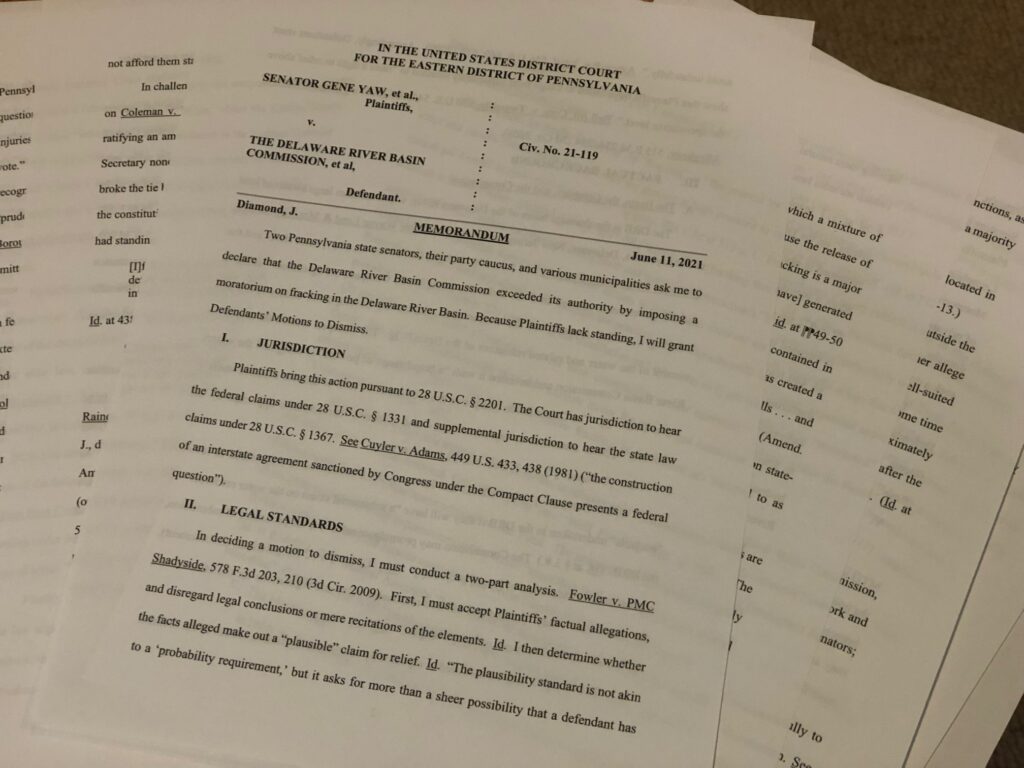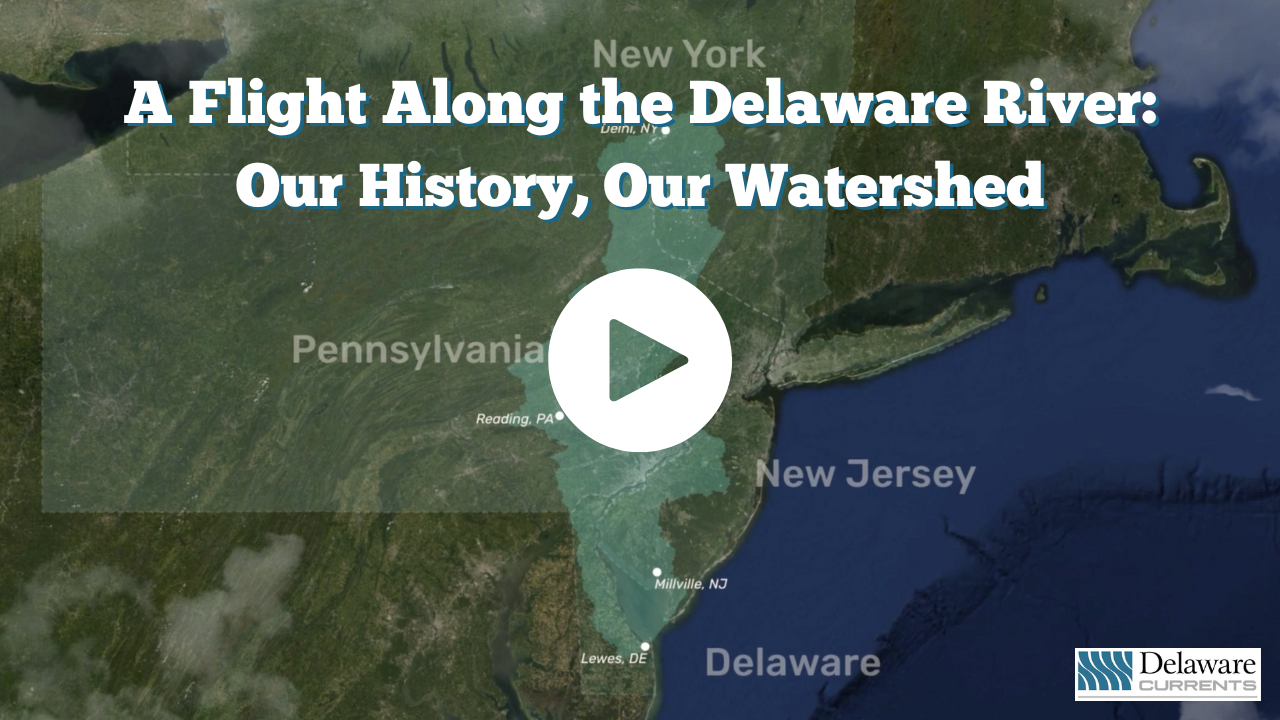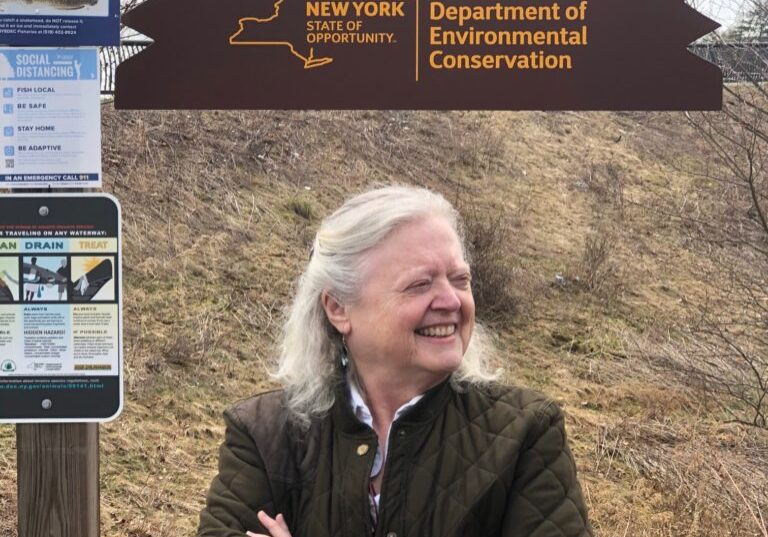
Federal judge dismisses fracking lawsuit brought by 2 Pa. state lawmakers
| June 17, 2021
A federal judge has dismissed a lawsuit brought by two Pennsylvania Republican state lawmakers against the Delaware River Basin Commission in which they claimed a moratorium the agency imposed on fracking for natural gas was a regulatory overreach.
The suit, which was brought by state Senators Gene Yaw and Lisa Baker, said a 2009 moratorium imposed by the commission’s then executive director, Carol Collier, amounted to an unconstitutional “taking” of private and public property.
The moratorium paused fracking, the process of using high-volume hydraulic fracturing to extract natural gas from underground rock formations, while the commission drafted regulations about the practice, which it worried would have adverse effects on the environment.
The ban extended to the entire watershed, which covers parts of Delaware, New Jersey, New York and Pennsylvania, but particularly affected were those Pennsylvania counties that are home to the nation’s largest gas field in the Marcellus Shale formation.
In February, the commission finally adopted formal rules banning fracking.
“For present purposes, these contentions are quite beside the point and underscore that this dispute is essentially political and so best resolved by the political branches of government.”
— Judge Paul S. Diamond for the Eastern District of Pennsylvania
Intervening defendants, including Bucks and Montgomery Counties, a collection of Pennsylvania Democratic senators, the Delaware Riverkeeper Network and its executive director, Maya K. van Rossum, argued that the plaintiffs lacked standing to bring the court action.
A judge agreed.
The judge, Paul S. Diamond for the Eastern District of Pennsylvania, said the issues needed to be addressed in the halls of government and not a courtroom.
“Parties hotly debated fracking’s benefits and harms,” he wrote. “For present purposes, these contentions are quite beside the point and underscore that this dispute is essentially political and so best resolved by the political branches of government.”
The judge dismissed arguments that the plaintiffs, which also included the Pennsylvania Senate Republican Caucus, Damascus and Dyberry Townships and Wayne and Carbon Counties, were harmed.
Baker and Yaw agued, in part, that state law vests them with interest enough to confer standing and that they were “trustees” under the Pennsylvania Environmental Rights Amendment.
The judge said those theories were “novel” but “meritless.”
“Although all plaintiffs argue vigorously that they have standing, they do not,” Diamond wrote.
Among the claims the lawmakers and others made: A group of landowners in Wayne County had spent $750,000 in legal fees to negotiate a fracking lease before the moratorium but that it was terminated after it went into effect.
The judge said a complaint was “repleted with allegations” that the DRBC and the state government had harmed citizens but ultimately failed to back up those assertions.
Diamond said the municipalities might be able to articulate how they were harmed by the moratorium and allowed them to file an amended complaint, leaving a strand of the case unresolved.
It was not clear if the plaintiffs would appeal Diamond’s ruling. The offices of Baker and Yaw and a lawyer who represented them and the caucus did not respond to emails seeking comment.
“We are pleased, but not surprised” that the judge dismissed the case, van Rossum of the Riverkeeper Network said in a statement. The DRBC declined to comment.
The ruling brings mostly to a close at least one case that challenged the DRBC over the moratorium while a separate but related suit remains pending.
The senators filed their lawsuit in January after trying unsuccessfully to intervene in a case filed in 2016 by Wayne Land and Mineral Group that raised similar issues concerning the commission’s moratorium.
In that case, both sides agreed last month to pause the case, which was originally scheduled to go to a non-jury trial in October.
Both sides are due to file a joint report to the court every six months about the status of legal challenges to fracking in the river basin and about whether they believe the stay should remain in place.
The commission maintains in court filings that the Mineral Group suit is now moot and the case should be dismissed after it adopted regulations banning fracking in the watershed.
What effect, if any, the dismissal of the suit brought by Yaw and Baker will have on the Mineral Group’s case is unclear.
A lawyer for the group, Christopher R. Nestor, noted that the judge in the lawmakers’ case allowed the municipalities a chance to file an amended complaint.
“Also, we do not know whether the parties will seek to appeal the dismissal to the Third Circuit,” he said. “As such, we believe it is premature to discuss next steps for our pending DRBC case, which is currently stayed by stipulation of the parties.”



![DC_Image [Image 4_Assunpink Meets Delaware] meets Delaware The Assunpink Creek on its its way to meet the Delaware River. The creek passes through woods, industrial and commercial areas and spots both sparkling and filled with litter.](https://delawarecurrents.org/wp-content/uploads/bb-plugin/cache/DC_Image-4_Assunpink-meets-Delaware-1024x768-landscape-14f069364113da5e8c145e04c9f2367c-.jpg)



